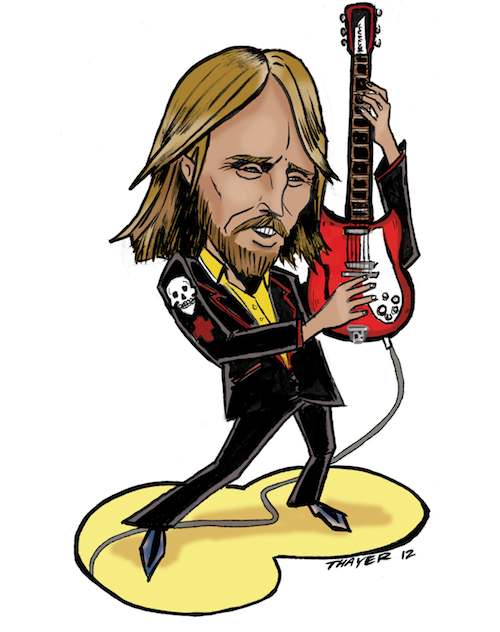Johnny Cash once said that “Southern Accents” should be the new anthem of the South.
Its author, Tom Petty, has been based in Los Angeles since 1975, but in recent years he has returned to his Southern roots. He grew up in Gainesville, Florida, and the band’s 2011 album, the bluesy MOJO, was cut live in a room and sounds as if it could have been recorded at Cosimo Matassa’s J&M Studio.
Petty talks about his Southern musical heritage:
Tell me a bit about growing up in Florida. Didn’t you have an early run in with the Elvis?
In 1961, I met him when I was 11. My uncle processed film in Gainesville and worked on some things like The Creature from the Black Lagoon, then an Elvis film, Follow That Dream, came through. I was sitting under a pine tree doing nothing when my aunt pulled in and said, “Would you like to go see Elvis Presley? They’re filming in Ocala.” I just had a vague memory of Elvis from when I was around five or six and there was a big commotion in the house about Elvis and his wiggle.
We rode down to Ocala, 30 miles away. We went back behind a chain link fence where they had some trailers lined up for the actors. I remember a long line of white Cadillacs that came in, and getting out were guys in mohair suits—very flashy lookin’ cats in sunglasses. Every time one would get out, I’d say to my aunt, “Is that Elvis?” and she’d say, “No.” Then all of the sudden, she went, “That’s Elvis.” And it really was a semi-religious experience. He glowed. I’d never seen anyone’s hair dyed so black that it was blue. He looked amazing. My uncle was there, and he says, “Elvis, these are my nieces and nephews.” He said hi, and then he went in his trailer.
We stayed and watched them film throughout the day. At one point a crowd was handing records over the fence for him to sign. I was like, “Damn, if I had an Elvis record I could get an autograph.” When we went home, I was a changed person. I set about finding Elvis records, so I could get Elvis’ autograph in case I went back. That was how I fell in love with rock ‘n’ roll records, and that was my only interest ever since.
When did you first get a guitar and start learning how to play?
It never struck me that I might play or perform. I just wanted to listen. It wasn’t until the Beatles that there was a real bolt of lightning to the brain: “Oh, a self-contained band.” They had the singers and the band all in one thing. Then, the kids around the neighborhood would talk about “let’s form a group and be like the Beatles.” It looked to me like a really good job. They were obviously young and in charge of their own lives.
I loved music so much that I hustled up a guitar and got in a group long before I could play. [laughs]
Were you on the same circuit as Lynyrd Skynyrd and the Southern rock thing?
Yes, though they didn’t call it that then because it hadn’t become anything that had a name. I thought of Lynyrd Skynyrd before they started making records as being like a British blues band. That was how they presented themselves.
What were your band’s influences?
Mudcrutch was strongly British Invasion-influenced and hung on to that into the early ‘70s. Then we were trying to be the Southern version of the Flying Burrito Brothers. We stuck a lot of country and ‘50s rock into our stuff and tried to blend it all together.
Who else was on the Florida club circuit when you started out?
The Allman brothers were from Daytona Beach and had a band called the Escorts. They were one of the first groups I ever saw. I remember they did a really good [Sam the Sham and the Pharoahs’] “Woolly Bully.” They were a four-piece band and wore suits like the Beatles. They were the first group other than the Beatles that I saw in real life that had long hair, and it dawned on me, “Oh, other people are gonna do this.” [laughs] I thought only the Beatles could wear their hair that way. But they were really impressive because they were completely committed to music. They did a lot of Impressions and Ray Charles stuff. I wouldn’t have picked up on that if they hadn’t turned me onto it.
Does your own Southern-ness need sustaining?
I can never get rid of it. I think it really helped [the Heartbreakers]. We really did have to learn to play, to deliver. Once you got up onstage, you really gotta play, or it would be “Okay, that’s enough of you. We have some guys up here that work on tractors all day, but they can play like crazy.” We were all just shitkickers then.
Tom Petty & the Heartbreakers play Jazz Fest on Saturday, April 28 at 5:10 p.m. on the Acura Stage.





